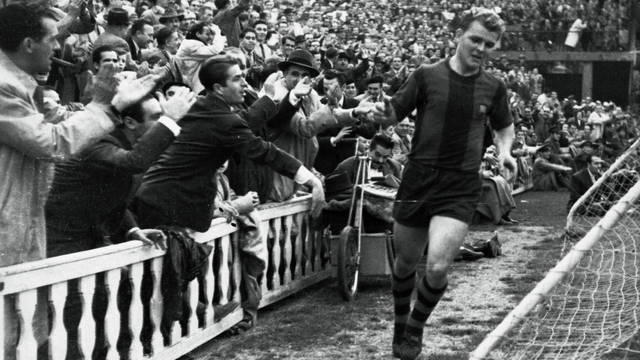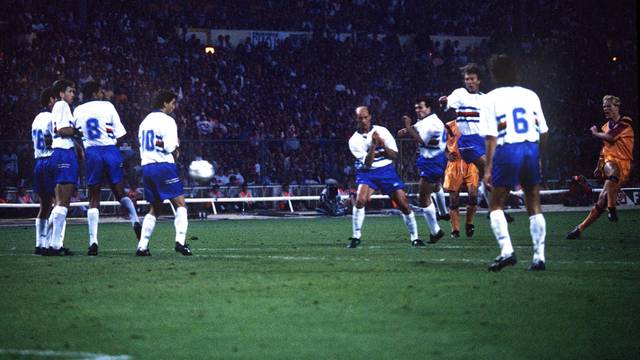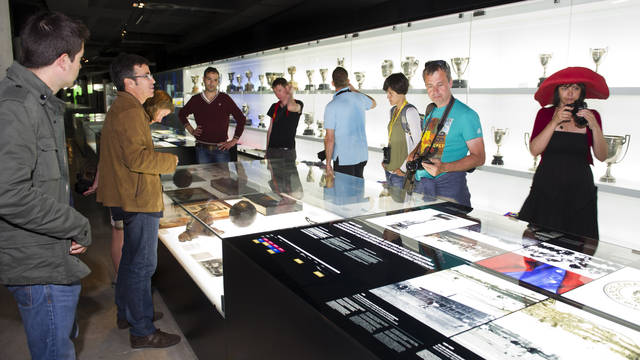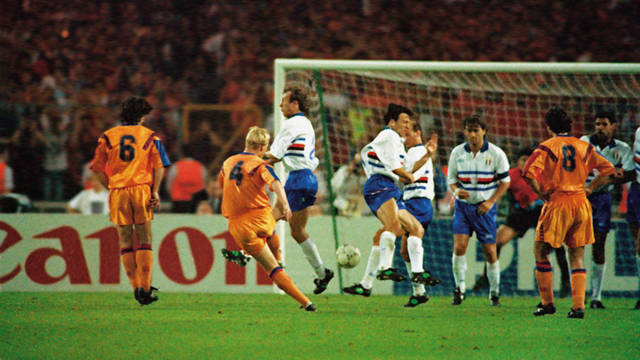Classik
Member
- Jul 5, 2011
- 13,694
- 338
- Thread starter
- #1,261
CLUB
Kubala’s early years
05/17/2012 16:15
Ten years after his death, we look back at the Hungarian’s early years and his arrival at Barça
The Cold War is key to understanding the context in which Kubala took his first steps as a professional footballer
A fantastic performance in Sarrià opened the doors to Kubala’s joining Barça- but he still had to sit out almost a whole year before he could make his debut for the Club

Kubala celebrates a goal in Les Corts, 1951-52 /PHOTO: ARXIU FCB
Ladislau Kubala was a player who very much defined a before and after for FC Barcelona, but one of the least known facets of his life is his early years in the turbulent pre-war era and then during the cold war which so affected his native Hungary. Today, ten years after his death, we recall those early years.
The boy with the ball
Ladislau Kubala Stecz was born on June 10th 1927 in the outskirts of Budapest. His father, Pavel, was a builder and his mother Anne, worked in a cardboard box factory. Both of them were Slovaks and had cometo the Hungarian capital to escape from the extreme poverty of Bratislava.
Kubala, however, enjoyed a happy childhood and he was always a keen footballer from hisearly days – encouraged by his school teachers who saw in the stocky fair haired boy the makings of a star. Kubala had a footballing background of course, as his father had also turned out for Ferencvaros.
His mother made balls of paper and cardboard which the young Kubala – known in his neighbourhood as “the boy with the ball†–was to be found playing wherever he could – on the streets, in the parks, on any piece of wasteland he could find.
A young star
In 1939, when he was still just 11 years old, he was already playingfor Ganz, but the outbreak of the war meant that organised football was put on hold, so not until the 1944/45 season did Kubala return to the limelight when he signed his first professional contract with Ferencvaros. Soon after he earned his first call up for the national team.
In 1945, he signed for Bratislava, one of the top Slovakian teams and in another example of his total commitment to the game, he asked the club to let him sleepat the ground so that he could train even more. His coach was Fernando Daucik, later to becomehis brother-in-law. Two years later he had really arrived – winning 10 caps for Czechoslovakia and the league title with Bratislava. On 17th April1947, he married Anna Viola Daucik, his coach’s sister.
Soon after, the directors of Vasas – the new name for Ferencvaros- convinced him to re-sign and on his return to Budapest he showed his generosity by taking all the many poor people he came across in the city to a clothes shop where he treated them to new clothes. On the field,Vasa won the Central European Tournament and he again appeared for the Hungarian national team.
Escape from Hungary
However Kubala felt stifled in theatmosphere of post-war Hungaryand after a Vasa game at the startof 1948 he escaped to Austria with a number of team mates. Hisescape in a lorry and then on foot, involved him dressing up as a soviet soldier at one point, but eventually they climbed over the snowy peaks to reach Austria. His wife and son, Branko, were left behind in Czechoslovakia and he was not to meet up with them again until June 1949.
Kubala arrived in Innsbruck, the capital of Tyrol and close to the Italian border. At Busto Arsizio, close to Milan, a team called Pro PÃ tria played and they attemptedto sign Kubala, only for the Hungarian Federation to deny him, but a promise from the FIFA President that a one-year suspension would resolve the problem, led to Kubala finally signing on March 20th 1948.
He played a number of friendly games for the Italians, but his case dragged on and Torino began to express an interest in signing him. The Italian giants invited him to Portugal where they were playing in Lisbon, but as he was preparing to leave, Kubala received the news that hiswife and son had left Czechoslovakia and were waitingfor him Udine. The missed trip proved to be a lucky break, as on their return from Lisbon on May 4th 1949, the Torino party suffered a horrific plane crash which ended the lives of virtuallythe whole team.
Things became even more difficult for Kubala in Italy now and he was forced to live with his family in the old Cinecittà filmstudios in Rome, which were being used to house refugees. Fernando Daucik, who had also fled Bratislava, suggested the formation of a team of expats to 'play against the nations who were offering to take the refugees in. The new team played against Espanyol at on June 15th 1950 and Kubala was the star of the game – scoring four goals.
Signs for Barça
Agustà Montal i Galobart, the thenFC Barcelona President, watched the game and told the technical secretary Josep Samitier: “that kid is extraordinary. We can’t let him go – prepare a contract rightnow!†Within a few hours, Kubala was a Barça player, but even though Daucik had become manager at the Club, Kubala was still banned and the team had to settle for fourth place in the 1950/51 season.
The happy ending to Kubala’s troubles came just as Kubala was about to be granted Spanish citizenship (something he finally got on June 1st 1951), when FIFA formally announced that his linkswith Vasas were broken, as the Hungarian authorities had no jurisdiction over what was now aforeign player. On the point of reaching 24, Kubala finally received permission to play in April 1951 and the footballer who was to become a Barça legend was born again in Catalonia.
FCB,
Manel Tomà s
Kubala’s early years
05/17/2012 16:15
Ten years after his death, we look back at the Hungarian’s early years and his arrival at Barça
The Cold War is key to understanding the context in which Kubala took his first steps as a professional footballer
A fantastic performance in Sarrià opened the doors to Kubala’s joining Barça- but he still had to sit out almost a whole year before he could make his debut for the Club

Kubala celebrates a goal in Les Corts, 1951-52 /PHOTO: ARXIU FCB
Ladislau Kubala was a player who very much defined a before and after for FC Barcelona, but one of the least known facets of his life is his early years in the turbulent pre-war era and then during the cold war which so affected his native Hungary. Today, ten years after his death, we recall those early years.
The boy with the ball
Ladislau Kubala Stecz was born on June 10th 1927 in the outskirts of Budapest. His father, Pavel, was a builder and his mother Anne, worked in a cardboard box factory. Both of them were Slovaks and had cometo the Hungarian capital to escape from the extreme poverty of Bratislava.
Kubala, however, enjoyed a happy childhood and he was always a keen footballer from hisearly days – encouraged by his school teachers who saw in the stocky fair haired boy the makings of a star. Kubala had a footballing background of course, as his father had also turned out for Ferencvaros.
His mother made balls of paper and cardboard which the young Kubala – known in his neighbourhood as “the boy with the ball†–was to be found playing wherever he could – on the streets, in the parks, on any piece of wasteland he could find.
A young star
In 1939, when he was still just 11 years old, he was already playingfor Ganz, but the outbreak of the war meant that organised football was put on hold, so not until the 1944/45 season did Kubala return to the limelight when he signed his first professional contract with Ferencvaros. Soon after he earned his first call up for the national team.
In 1945, he signed for Bratislava, one of the top Slovakian teams and in another example of his total commitment to the game, he asked the club to let him sleepat the ground so that he could train even more. His coach was Fernando Daucik, later to becomehis brother-in-law. Two years later he had really arrived – winning 10 caps for Czechoslovakia and the league title with Bratislava. On 17th April1947, he married Anna Viola Daucik, his coach’s sister.
Soon after, the directors of Vasas – the new name for Ferencvaros- convinced him to re-sign and on his return to Budapest he showed his generosity by taking all the many poor people he came across in the city to a clothes shop where he treated them to new clothes. On the field,Vasa won the Central European Tournament and he again appeared for the Hungarian national team.
Escape from Hungary
However Kubala felt stifled in theatmosphere of post-war Hungaryand after a Vasa game at the startof 1948 he escaped to Austria with a number of team mates. Hisescape in a lorry and then on foot, involved him dressing up as a soviet soldier at one point, but eventually they climbed over the snowy peaks to reach Austria. His wife and son, Branko, were left behind in Czechoslovakia and he was not to meet up with them again until June 1949.
Kubala arrived in Innsbruck, the capital of Tyrol and close to the Italian border. At Busto Arsizio, close to Milan, a team called Pro PÃ tria played and they attemptedto sign Kubala, only for the Hungarian Federation to deny him, but a promise from the FIFA President that a one-year suspension would resolve the problem, led to Kubala finally signing on March 20th 1948.
He played a number of friendly games for the Italians, but his case dragged on and Torino began to express an interest in signing him. The Italian giants invited him to Portugal where they were playing in Lisbon, but as he was preparing to leave, Kubala received the news that hiswife and son had left Czechoslovakia and were waitingfor him Udine. The missed trip proved to be a lucky break, as on their return from Lisbon on May 4th 1949, the Torino party suffered a horrific plane crash which ended the lives of virtuallythe whole team.
Things became even more difficult for Kubala in Italy now and he was forced to live with his family in the old Cinecittà filmstudios in Rome, which were being used to house refugees. Fernando Daucik, who had also fled Bratislava, suggested the formation of a team of expats to 'play against the nations who were offering to take the refugees in. The new team played against Espanyol at on June 15th 1950 and Kubala was the star of the game – scoring four goals.
Signs for Barça
Agustà Montal i Galobart, the thenFC Barcelona President, watched the game and told the technical secretary Josep Samitier: “that kid is extraordinary. We can’t let him go – prepare a contract rightnow!†Within a few hours, Kubala was a Barça player, but even though Daucik had become manager at the Club, Kubala was still banned and the team had to settle for fourth place in the 1950/51 season.
The happy ending to Kubala’s troubles came just as Kubala was about to be granted Spanish citizenship (something he finally got on June 1st 1951), when FIFA formally announced that his linkswith Vasas were broken, as the Hungarian authorities had no jurisdiction over what was now aforeign player. On the point of reaching 24, Kubala finally received permission to play in April 1951 and the footballer who was to become a Barça legend was born again in Catalonia.
FCB,
Manel Tomà s











































